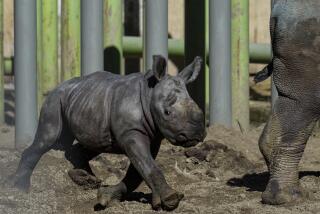San Diego Zoo and a sanctuary in Kenya announce plan to save northern white rhinos
- Share via
An ambitious, scientifically-complex plan aimed at saving one of the world’s most endangered species -- the northern white rhino -- was announced Thursday by the San Diego Zoo and the Ol Pejeta Sanctuary in Kenya.
Only four northern white rhinos remain in the world: one aging female at the San Diego Zoo Safari Park, and one male and two females at the sanctuary.
In a news conference at the Safari Park, officials explained that several options may be tried, including in-vitro fertilization in Africa, with the resulting embryo then implanted in a female southern white rhino acting as a surrogate.
At the Safari Park, the plan could involve using the DNA on file at the Institute for Conservation Research’s Frozen Zoo to create a stem cell line, and then an embryo that would be implanted in a female southern white rhino.
Despite the difficulties, Richard Vigne, the sanctuary’s chief executive, said he remains optimistic.
“It’s been done in cattle, horse and humans -- it’s doable,” he said.
Once accomplished, the process might also be used for other endangered species, he said. “There are thousands of species facing this same predicament,” he said.
Still, he said that the process may not be accomplished until all four of the northern white rhinos are gone. “The species could then be reintroduced,” he said.
Among the many problems is that no technology exists to extract eggs from living northern white rhinos. Scientists must wait until a female northern white rhino dies and then rush to harvest the eggs.
At the Safari Park, 41-year-old Nola is geriatric and being treated for several age-related ailments. She arrived at the Safari Park in 1986 from what is now the Czech Republic. She is no longer considered a candidate for motherhood.
Even when she was younger, Nola had no interest in mating with the Safari Park’s male northern white rhino, Angalifu, who died in December at age 44.
Northern white rhinos once roamed over much of central Africa, but decades of poaching, habitat devastation and civil war have pushed the species to the point of extinction.
Long considered a cure-all for disease, rhino horn sells for enormous sums on the black market, particularly in Vietnam.
The Ol Pejeta Sanctuary received the northern white rhinos in 2009 from the Dvur Kralove Zoo in the Czech Republic in hopes that the climate and expansive grasslands would encourage breeding. That has not occurred.
For reasons that have left scientists perplexed, breeding efforts in captivity for the northern white rhino have been a flop. Similar efforts for the southern white rhino have been successful.
Six southern white rhino females arrived recently at the Safari Park from South Africa for possible use as surrogates for the northern white rhino reproduction program.
Meanwhile, vials of sperm from Angalifu are kept at the institute’s Frozen Zoo. When Nola dies, plans are to quickly remove her eggs.
Three northern white rhinos have died in the last 12 months: one each in San Diego, the Czech Republic and the Ol Pejeta Sanctuary.
To safeguard the remaining northern white rhinos at the Ol Pejeta Sanctuary from poachers, officials there have an armed 24-hour security force patrolling a 700-acre sanctuary.
At the Safari Park, Vigne made a point of visiting Nola.
“She’s old, but she’s a lovely animal,” he said.
Twitter: @latsandiego
More to Read
Sign up for Essential California
The most important California stories and recommendations in your inbox every morning.
You may occasionally receive promotional content from the Los Angeles Times.









